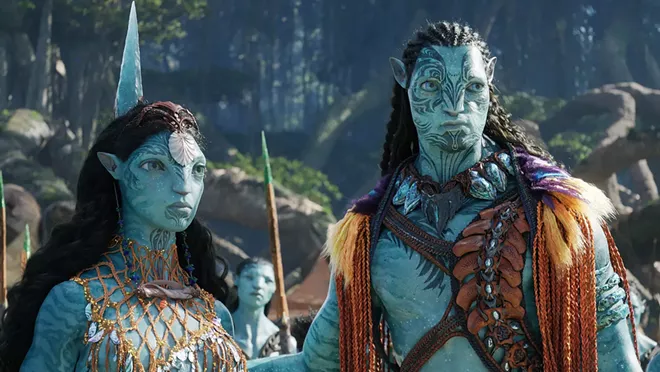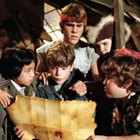If there was ever a film that could win over those who were agnostic or even antagonistic about the original Avatar, Avatar: The Way of Water would be it. A science fiction epic that is far more emotionally engaging than its predecessor, it moves away from the high-flying sequences to instead dive headfirst into a rich ocean world teeming with life. Operating on a vast canvas, it makes use of remarkable performance capture crossed with stunning special effects to create a vibrant setting that feels like you could almost reach out and touch it. Always interested in what lies beneath in the unexplored underwater worlds, writer/director James Cameron now takes us with him on a journey into the depths and reminds us that he still has got an eye for splendor. Even as its presentation is hamstrung by the persistent use of a high frame rate that takes some getting used to, the awe of letting the visuals envelop and wash over you is truly unparalleled.
We pick right back up where we last left these characters when human-turned-Na'vi Jake Sully (Sam Worthington) and Neytiri (Zoe Saldaña) had managed to drive the corporation that was mining Pandora's resources off the planet. Years then pass as we see that the two have now started a family. In many ways, the couple are not the protagonists of this story. Instead, we spend most of the film with their children, watching as they struggle with growing up and reckoning with their respective lineages that make them outsiders from the rest of the Na'vi. On top of that, the humans have now returned with a greater force in order to continue extracting resources and begin the process of colonizing the planet. Fire consumes everything when they touch down, and the city they build in the ashes is impressive though pointedly cold. The Na'vi then take up the fight once more to disrupt the decimating process of colonization by waging a guerrilla warfare campaign. However, ghosts from their past send Jake and his family on the run as he reflects on their future and the potential of losing everything.
While much of this resembles the story that was already told in the first film, even making use of the same often clunky narration all the way up until the humorously familiar final shot, there is much that elevates Avatar: The Way of Water as a distinct work. The Na'vi, who often felt like they were secondary to Jake's journey in the first film, are now central to the experience. The introduction of a new clan with their own way of life, unique physiology and home in the water is where this film is at its best. They feel infinitely more multidimensional and complicated. Just getting to spend time with them as they do everything from going diving to communing with whale-like creatures, which becomes an integral part of the narrative, is breathtaking to behold.
While moments of the original Avatar felt oddly hollow, everything in The Way of Water is so fully realized. It's leaps and bounds above that earlier work. There is a greater patience that does wonders in building this world and those who inhabit it. When this builds to an extended climactic fight that makes up the entire last act, all the emotional stakes feel far more genuine and fleshed out. It also gets a great deal darker and violent, including one surprisingly disarming moment that holds a cathartic poetic resonance. It is a work that opens a whole host of doors, both in a technological and thematic sense, to an intriguing future where Cameron gets to continue his journey of exploration. ♦























